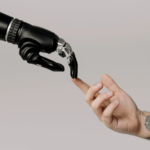Artificial Intelligence (AI) is bringing about revolutionary changes in the pharmaceutical industry. By using automation and algorithms, AI is a potent tool that may assist scientists and medical professionals in doing their duties more effectively.
This article discusses 5 significant applications of AI in the pharmaceutical sector, and how doctors and patients are benefiting from its implementation.
Drug Development
The application of AI has the potential to advance research and development. AI is capable of anything, from developing and detecting novel compounds to discovering and validating target-based medications. Additionally, AI can significantly enhance results from HCS High Content screening experiments. Integrating AI with HCS improves the efficiency and accuracy of drug discovery processes, ultimately revolutionizing biomedical research.
A pharmaceutical firm must spend anywhere from US$ 161 million to US$ 2 billion for medicine to complete a clinical study and receive FDA clearance.
These are the two key factors driving the growing use of AI by the pharmaceutical industry to lower operating costs, increase medicine and therapy affordability, and increase the success rates of new treatments.
AI can boost productivity, efficiency, and the creation of life-saving medications faster than ever before, from quality control to process automation.
Pharmaceutical companies also appreciate the lower costs associated with introducing new medications to the market.
Disease and Epidemic Prediction
With baffling advancements like an AI particle analyser and self-driving cars, the pharmaceutical industry is making use of AI more regularly.
Many pharmaceutical businesses and healthcare providers now use AI to track and predict epidemic outbreaks throughout the world.
These technologies draw information from various online sources, analyze how different geological, environmental, and biological factors affect the health of the population in various regions, and attempt to draw connections between these factors and previous epidemic outbreaks.
Such AI models are especially beneficial for developing nations without the financial and medical infrastructure needed to handle an epidemic breakout.
Since AI can evaluate enormous amounts of data, pharmaceutical companies have been able to swiftly find and diagnose novel ailments.
Although this is more directly related to healthcare, by using these techniques, they can hasten the diagnosing process, helping to preserve lives. New remedies can then be created by discovering new illnesses.
By employing its capacity to examine a large amount of data and identify trends, AI plays a critical role in avoiding illnesses. This aids in the early detection of disorders so that they may be treated more successfully.
Based on their medical history and other criteria, AI may identify patients who may get ill, allowing clinicians to provide preventative care. To determine if illnesses are spreading fast, it also examines data from social media and other sources.
Information Delivery and Gathering
Although AI has significantly improved many pharma workflows and procedures, it can also negatively influence the industry’s struggle with information overload.
As diseases are discovered, new medications are developed, and laws are changed, the amount of data produced has increased.
AI can be used to its full potential in information management, handling and analyzing more data than humans.
AI can also enhance candidate selection procedures for clinical trials and provide more useful information for patients. This also applies to mammograms and MRI pictures.
The healthcare sector will be significantly impacted by AI, but there is also the added benefit of AI employment opportunities in the future.
With its growing adaptability, AI will integrate into the industrial and pharmaceutical industries as a natural process.
Remote Monitoring
The future of AI has arrived and with it comes new ways to implement it into various industries.
Despite AI’s significant contribution to improving several workflows and procedures within the pharmaceutical business, it may also contribute to the sector’s ongoing struggle with information overload.
More data is being produced as diseases are discovered, medications are developed, tested, introduced to markets, rules are altered, and so forth. This shows that more data has to be gathered, analyzed, shared, comprehended, and responded to.
You can see that there is a lot. But information management is only one of the many fields where AI may be used effectively. Since computers collect and analyze data more quickly than humans can, they can provide more insights and analysis than humans can.
Pharmaceutical firms may stay up to date on the newest data by utilizing AI, and by letting AI handle the labor-intensive task of uncovering and providing the insights that are most important to you, you have more time to concentrate on using that data to inform business choices.
Marketing
AI already has a significant role in the world of marketing.
Being that the pharmaceutical business is a sales-driven industry, AI can be a useful tool in pharma marketing. Pharmaceuticals may investigate and create distinctive marketing tactics with AI that promise strong sales and brand recognition.
AI may help map the customer journey, enabling businesses to see which marketing strategy brought people to their website and eventually convinced those visitors to purchase from them.
The pharmaceutical industry may therefore concentrate more on the marketing tactics that provide the highest conversions and revenue growth.
AI systems may evaluate and compare the outcomes of previous marketing initiatives to determine which ones continued to be the most successful.
This saves time and money while also enabling businesses to design their current marketing strategies properly. In addition, AI systems can even expect to determine the success or failure rate of marketing efforts.








